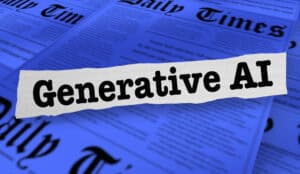
Red Hat unveiled Podman AI Lab, which simplifies the development of generative AI (GenAI)-powered applications through containers. And it expanded its partnership with Elastic to improve AI search.
Red Hat unveiled Podman AI Lab—an extension for Podman Desktop designed to simplify the development of generative AI (GenAI)-powered applications through containers, at this week’s Red Hat Summit.
The tool aims to democratize GenAI by offering developers an intuitive graphical interface for building, testing, and running AI applications directly from their local workstations. The Podman AI Lab enhances the local development experience with its cost-efficiency, simplicity, and ability to control sensitive data, empowering developers to integrate AI seamlessly into their workflows without needing expensive infrastructure.
Streamlining AI Application Development
Podman AI Lab is positioned as a user-friendly platform that reduces the complexity typically associated with developing intelligent applications. By providing a playground environment, developers can experiment with AI models safely and securely, applying them to various aspects of their code and workflows.
This tool has a recipe catalog that includes sample applications for immediate use. These applications range from chatbots, which enhance customer interaction, to text summarizers for efficient content management across various industries. Developers can also leverage code generators to automate routine coding tasks, object detection for image and video analysis, and audio-to-text transcription services, facilitating various functionalities that enhance productivity and creativity in application development.
Enabling Flexibility and Innovation in AI
The Podman AI Lab extends the convenience of container technology to AI model integration. It allows developers to provision local inference servers easily, streamlining the process of running models locally and integrating new AI capabilities into applications. Additionally, the lab’s playground environment offers a hands-on approach for developers to interact with, test, and refine AI models, ensuring they can select the optimal model and settings for their specific needs.
With over one million downloads, Podman Desktop’s success underpins the new AI Lab, which seamlessly integrates with image mode for Red Hat Enterprise Linux. This integration facilitates the transition from local development to deployment across the hybrid cloud, supporting applications on various platforms from bare metal to cloud instances with Red Hat OpenShift. As AI continues to become a staple in enterprise environments, Red Hat remains at the forefront, driving AI innovations that are consistent, reliable, and expansive across its hybrid cloud portfolio.
See also: Red Hat Summit Keynote: Red Hat Doubles Down on AI
Teaming with Elastic to Boost AI Search
In other news from the summit, Red Hat announced enhancements to its partnership with AI search company Elastic. The effort aims to provide advanced search experiences utilizing retrieval augmented generation (RAG) via Elasticsearch, integrated on Red Hat OpenShift AI. This expanded collaboration is set to equip enterprises with tools for implementing, maintaining, and refining RAG solutions on a unified platform, ensuring efficient integration of large language models (LLMs) into business applications using private data stores.
Enhancing AI Integration with RAG
The introduction of RAG into enterprise operations is a strategic move to merge the capabilities of LLMs with private datasets. This allows for training models with specific, confidential data without altering the base model. The effectiveness of RAG relies significantly on robust search retrieval systems that can handle large-scale, private data repositories efficiently. Elasticsearch’s role in this partnership is crucial, as it serves as the vector database solution that enables secure and scalable search capabilities. This ensures sensitive data remains protected while being utilized to enhance the capabilities of general-purpose LLMs.
Red Hat OpenShift AI and Elasticsearch: A Synergistic Approach
Red Hat OpenShift AI and Elasticsearch provide a comprehensive solution for organizations looking to leverage RAG at both the infrastructure and application levels of MLOps. OpenShift AI offers a reliable platform for automating, building, tuning, deploying, and monitoring AI models at scale. Concurrently, Elasticsearch enhances this ecosystem with its vector database capabilities and advanced search functionalities, making it easier for enterprises to generate pertinent AI-driven responses. Additionally, Elasticsearch supports the Elasticsearch Relevance Engine™, which facilitates the development of next-generation search applications using proprietary data. This engine supports semantic search and RAG applications, integrating with third-party ML models and tools from various providers.
This collaborative effort improves AI functionalities within business applications and fosters greater innovation and integration within Red Hat’s extensive network of AI partners. By facilitating more effective use of underutilized data, Red Hat and Elastic are helping enterprises gain a competitive edge, encouraging broader AI adoption, and increasing the diversity of AI solutions available in the market.



























